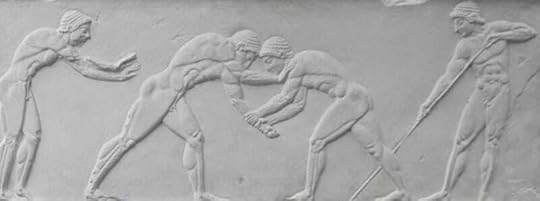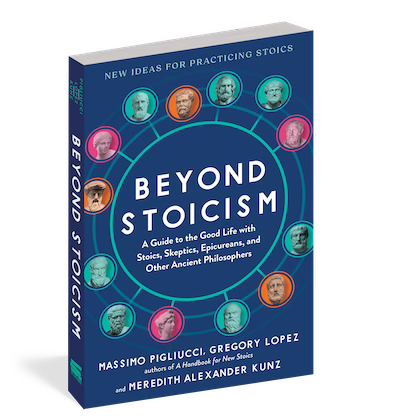Massimo Pigliucci's Blog, page 10
September 20, 2024
Epicurus's Letter to Menoeceus
 Epicurus, image from nypl.getarchive.net, CC license
Epicurus, image from nypl.getarchive.net, CC licenseThe Practical Wisdom podcast I produce is not for the faint of heart. Each series of episodes presents a deep dive into a single text from the Greco-Roman wisdom tradition. From time to time, as in the case of this post, it may helpful to pause and collect together all the entries referring to the same piece of classical writing, so that listeners can go back to them at their leisure, listen to them in sequence, and gain a broader appreciation...
September 18, 2024
How to Have a Life with Seneca

[Based on How to Have a Life: An Ancient Guide to Using Our Time Wisely, by Seneca, translated by James S. Romm. Full book series here.]
Life is short, isn’t it? Well, it depends on how you measure its length, and on how you weigh the relative importance of quality and quantity. One of the best sources for reflections on this theme surely is Lucius Annaeus Seneca’s De Brevitate Vitae, On the Shortness of Life, newly translated by James S. Romm for the ongoing Princeton University Press series, An...
September 16, 2024
Practice like a Stoic: 27, Act the opposite of anger
 Image from thebluediamondgallery.com, CC license.
Image from thebluediamondgallery.com, CC license.[This series of posts is based on A Handbook for New Stoics—How to Thrive in a World out of Your Control, co-authored by yours truly and Greg Lopez. It is a collection of 52 exercises, which we propose reader try out one per week during a whole year, to actually live like a Stoic. In Europe/UK the book is published by Rider under the title Live Like A Stoic. Below is this week’s prompt and a brief explanation of the pertinent philosophical backgro...
September 13, 2024
Plato on goodness vs bravery
“SOCRATES: Now, Nicias, could you explain it to us again from the beginning? You know we started our discussion by considering bravery as a part of goodness?
NICIAS: Yes, I do.
SOCRATES: So you did agree with our answer that it’s a part, and hence that there are other parts, which are known collectively as goodness, didn’t you?
NICIAS: Yes, of course.
SOCRATES: Now, you mean the same by these parts as I do, don’t you? For me, besides bravery, the list includes self-control, fairness and other simila...
September 11, 2024
Against scientism
 Science by Nick Youngson, CC license from pix4free.org
Science by Nick Youngson, CC license from pix4free.orgOne of the never ending discussions I’ve been involved since I have shifted career from evolutionary biology to philosophy of science is the issue of scientism. Heck, I have even co-edited (with my friend Maarten Boudry) a book about the darn thing. So let’s put the matter to rest once and for all!
Just kidding. I’m under no illusion that this essay will be the last word on the topic. Still, I have to try. The impetus for what you are now read...
September 9, 2024
Practice like a Stoic: 26, Turn difficulties into opportunities
 Ancient Greek wrestling, Parthenon freeze. Image from Wikimedia, CC license.
Ancient Greek wrestling, Parthenon freeze. Image from Wikimedia, CC license.[This series of posts is based on A Handbook for New Stoics—How to Thrive in a World out of Your Control, co-authored by yours truly and Greg Lopez. It is a collection of 52 exercises, which we propose reader try out one per week during a whole year, to actually live like a Stoic. In Europe/UK the book is published by Rider under the title Live Like A Stoic. Below is this week’s prompt and a brief explanation of the pert...
September 6, 2024
Epictetus on making progress
“What is the work of virtue? Serenity. Who, then, is making progress? The man who has read many treatises of Chrysippus? What, is virtue no more than this — to have gained a knowledge of Chrysippus? For if it is this, progress is confessedly nothing else than a knowledge of many of the works of Chrysippus. …
And where is your work? In desire and aversion, that you may not miss what you desire and encounter what you would avoid; in choice and in refusal, that you may commit no fault therein; in gi...
September 4, 2024
Book: Beyond Stoicism

Well, this is an unusual suggestion, since the book in question is my own! Or, rather, a co-production with my friends Meredith Kunz and Greg Lopez, the latter also the co-author of my A Handbook for New Stoics: How to Thrive in a World out of Your Control.
The new book is entitled Beyond Stoicism: A Guide to the Good Life with Stoics, Skeptics, Epicureans, and Other Ancient Philosophers, and is a very practical treatment of the major Classical and Hellenistic philosophies of life, including som...
September 2, 2024
Practice like a Stoic: 25, Deal virtuously with frustrating people
 Marcus Aurelius, image from citaty-slavnych.sk, CC license.
Marcus Aurelius, image from citaty-slavnych.sk, CC license.[This series of posts is based on A Handbook for New Stoics—How to Thrive in a World out of Your Control, co-authored by yours truly and Greg Lopez. It is a collection of 52 exercises, which we propose reader try out one per week during a whole year, to actually live like a Stoic. In Europe/UK the book is published by Rider under the title Live Like A Stoic. Below is this week’s prompt and a brief explanation of the pertinent philosophic...
August 30, 2024
Epicurus on security and pleasure
“Any means by which it is possible to procure freedom from fearing other people is a natural good.
Some people have desired to gain reputation and to be well regarded, thinking in this way to gain protection from others. If the lives of such people are secure, they have acquired a natural blessing; but if they are not, they do not possess what they originally reached for by natural instinct.
No pleasure is bad in itself. But the things that make for pleasure in certain cases entail disturbances ma...



